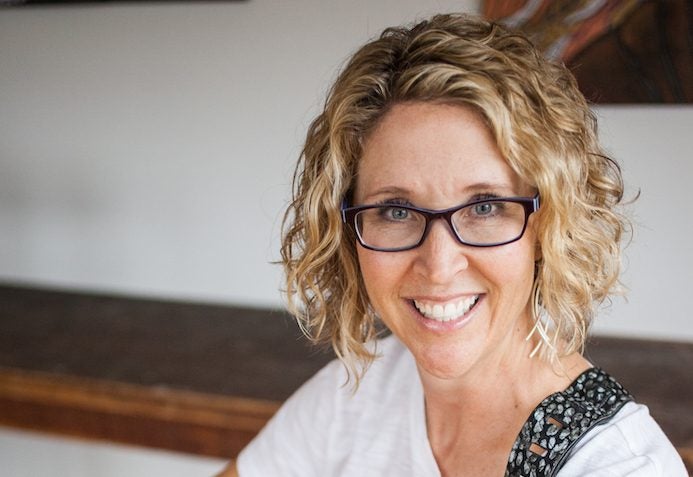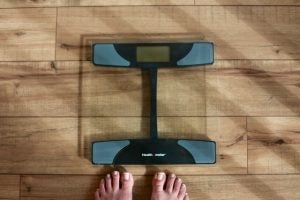Diet is a four-letter word: Part one
Published 8:14 am Saturday, January 13, 2018

- Erin Smith is the owner of the OM place in Winchester, the author of “Sensible Wellness” and the online host of the OM channel. Follow her on Twitter @erinsmithauthor.

I stood on the scale, horrified by the number staring back at me.
I stepped to the mirror and gazed at the unrecognizable figure. The woman in the mirror looked wrinkled, bloated, old.
I checked my Inner Critic and realized it wasn’t her speaking, but instead an emotionless deduction. It was as if I was out of my body, studying it from afar, left puzzled because it wasn’t my authentic self.
I have been backsliding into some older, lazier, less healthy habits lately. I walk, do yoga, practice mindfulness to keep stress at bay. I go to sleep early and start my days with a green smoothie. That should keep me at a healthy weight forever, right?
Not so fast. No one is immune to gaining weight at any time. Most of us gain between five and seven pounds during the holiday season. Because, and let’s be transparent here, crap food tastes pretty damn delicious.
My Achilles heel is carbs in all their glorious forms — pizza dripping in gooey cheese, crusts dipped in garlic butter and washed down with a cold beer on tap; bacon, with all those delicious but toxic nitrates, smooshed between slices of store-bought bread and slathered with mayo, the lettuce and tomato only playing supporting roles; sushi rolls drenched in soy sauce; Mexican food, literally drowned in guacamole and queso.
I could wax poetic about food all day long.
I adore food. I am one of those people who live to eat instead of eat to live. I want to talk about food, write about it, sit at one meal and plan the next. I’ll pore over a cookbook for hours, drooling at the gorgeous photos.
But that scale number is a warning sign, a harbinger of high cholesterol, thyroid issues, bad skin and too-tight pants. It is a wake up call to take better care of myself.
But I will not diet. On any given day, there are more than 100 million Americans on a diet.
While eating disorders are fairly rare, disordered eating is a cultural epidemic. Everyone wants a plan that will drive them straight to Skinny Street. Diet books that promise the “secret” to weight loss top non-fiction book sales every year. Add to those books meal plans, diet pills and weight loss surgeries, and you’ve got an industry worth more than $20 billion annually.
And yet, we continue to be the fattest country on the planet. As a nutritional coach, I’m constantly fielding questions about the most common eating plans — Paleo. Gluten-free. Veganism. Atkins. Fast Metabolism. Meal replacement. Whole 30. Wheat Belly.
If you’re a devotee of any of these, you probably should stop reading now, as you’re about to get riled up and defensive because I am passionately against diets for weight loss.
There is absolutely no scientific evidence diets work long-term. The statistics are depressing. On average, 85 percent of people who lose weight from a diet will gain it back and more in one to five years (depending on which research study you choose to believe, as it’s hard to get solid figures because of number-skewing things like weight loss from exercise, stress or health conditions).
Don’t believe me? Google images of the former The Biggest Loser contestants. It’s disheartening.
Overly-restrictive diets destroy your metabolism. Our bodies experience reduced calories as a threat to survival and slow our metabolism to keep us alive. And by cutting out whole food groups, we might be missing out on important nutrients. So being on a diet means you’re miserable in the short term from the strict restrictions and fat in the long term because your body’s ability to turn food into energy is wrecked.
Plus, diets just suck all of the pleasure out of eating. When eating is no longer fun, we experience more cortisol in our bloodstream, a stress hormone that makes it harder to burn calories and increases our belly fat. What a horrible cycle to choose to be on. Blurg.
So how in the world do we win at weight loss? It’s less complicated than the diet industry would have you believe.
I follow one eating rule: Eat real food, mindfully.
OK, so maybe that’s really two rules.
Interested in learning more? Check here next week as I explain how to adopt this one rule to change your health for the better.
Erin Smith is the owner of the OM place in Winchester, the author of “Sensible Wellness for Women” and the online host of a yoga and mindfulness channel for Eppic Films.Send her a shout out at erin@theOMplace.net or play along at www.theOMplaceChannel.com.





